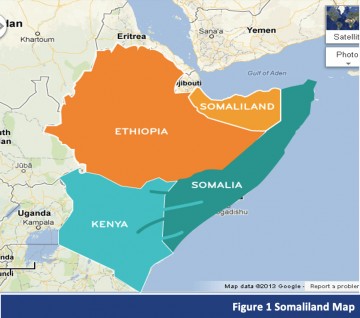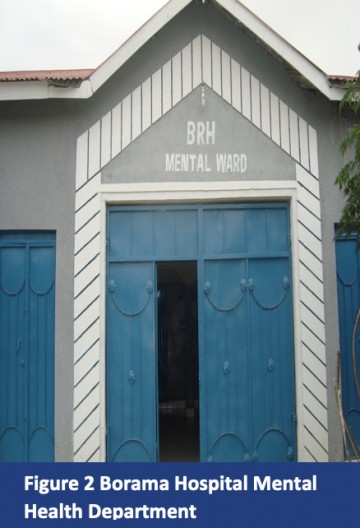Child and Adolescent Mental Health in Somaliland: History, Services and Future Aspirations
By Jibril I.M Handuleh1,2, MD MPH
1Psychiatry resident, Saint Paul’s Hospital Millennium Medical college, Addis Ababa, Ethiopia
2Lecturer, School of Public Health and Psychiatry, Amoud University, Borama, Somaliland
Somaliland is a de facto state in the horn of Africa. It declared its unilateral independence from the rest of Somalia in 1991. Despite the chaos, the political and security instability in Somalia, Somaliland has been stable for over three decades. During the early phases of the civil war most of the health professionals left the country and got resettled in the global north. It left the country with severe shortage of skilled health workers including mental health professionals.
Medical education was nonexistent in Somaliland for decades. By the year 2000, a global health partnership between Somaliland and King’s College London led to establishing two medical schools in Somaliland. Also a nursing school named Edna Adan school was founded by a retired World Health Organization veteran from the country [1].

Psychiatry education at the undergraduate level also started with visiting faculty under the UK-Somaliland collaboration mainly from the Maudsley Hospital in London in 2007. Since then, psychiatry education in medical schools became part of the mainstream education. In the first decade, the UK faculty led the teachings [2]. Final mental health exams for medical schools have both written and clinical parts, the later in the form of Objective Structured Clinical Examinations (OSCEs).
In addition to psychiatric education, the UK partnership in collaboration with Tropical Health and Educational Trust (THET) assisted setting up a mental health representative position which supported interns to have teaching and examiner roles under supervision of British psychiatrists. Within one year of the training, a mental health representative won a mental health services grant from THET for beginning mental health services from scratch at his home town of Borama in Somaliland [3]. We chose Borama as it was home to Amoud University, and it had active community engagement, strong international collaborations and academic resources compared to other towns in Somaliland.

A grant from THET funded Borama’s first mental health service from scratch for 2 years. This helped set up outpatient, inpatient and community mental health services [4].
The faculty at the Maudsley were diverse so we added school mental health outreach and a forensic psychiatry service. In the grant, we had the first opportunity to advocate and engage with the public on the issue of child and adolescent mental health in Somaliland [5].
Child and adolescent mental health was central to the larger public engagement efforts. Before embarking on child and adolescent mental health services, we did community awareness and promotion meetings. Elderly people, religious leaders and women associations were the groups that we selected to advocate and promote public mental health aspects of child and adolescent mental health in Somaliland.
Teachers and parents also joined a consultative meeting with the mental health unit at Borama Hospital. The association of school teachers in Borama had also requested a mental health service for the teachers and students alike. They pointed out that the mental health trauma of wars in Somaliland decades ago affected the mental health of parents. They knew that students, parents and teachers were suffering from mental health problems.
We chose to integrate CAP into our outpatient service and deliver school based mental health services in Borama. Since late 2011, Borama has had a child and adolescent mental health service as a part of its general psychiatry OPD services. At the same time, schools and the psychiatry department collaborated to serve the population of students and teachers with mental health disorders.
School principals communicated directly with the department to arrange both for emergency and outpatient mental health services.
Inpatient services for children and adolescents are not available in Somaliland. Outpatient care has been working well and a single seclusion room at the pediatric ward is the one bed available for inpatient emergencies. A dedicated team of a child and adolescent psychiatrist and a general adult psychiatrist from the UK supervised, mentored and observed colleagues that work in the service.
First, the whole team were general practitioners as Somaliland did not have a psychiatrist and the author who is a psychiatry trainee outside Somaliland with strong interest and aspiration to become a child and adolescent psychiatrist, offers telepsychiatry service to the Borama mental health unit over the weekends. Secondly, commitment to go for fellowship training in CAP and make international connections is there for us to develop our CAP capabilities.
In the future, there are plans for Somaliland to start its psychiatry residency program and psychiatry nursing program to address the mental health human resource. Current residents training in neighboring countries like Kenya and Ethiopia will return and contribute to the development of psychiatry and CAP in particular. At the same time, we shall be seeking partners in mental health education, research and service development.
Particular areas of focus will include school mental health, migration health and mental health effects of climate change, urbanization and substance use in Somaliland. Research collaboration regionally and globally will be appropriate for the country to build its mental health services in both child and adolescent and women’s mental health.
References
- Leather, A., Ismail, E.A., Ali, R., Abdi, Y.A., Abby, M.H., Gulaid, S.A., Walhad, S.A., Guleid, S., Ervine, I.M., Lowe-Lauri, M. and Parker, M., 2006. Working together to rebuild health care in post-conflict Somaliland. The Lancet, 368(9541), pp.1119-1125.
- Sheriff, R.S., Bass, N., Hughes, P., Ade-Odunlade, P., Ismail, A., Whitwell, S. and Jenkins, R., 2013. Use of interactive teaching techniques to introduce mental health training to medical schools in a resource-poor setting. African journal of psychiatry, 16(4), pp.256-263
- Handuleh, J., 2012. Experiences of a junior doctor establishing mental health services in Somaliland. Intervention, 10(3), pp.274-8.
- Handuleh, J., 2013. Transforming a Dumping Site into a Psychiatric Inpatient Unit in Somalia. American Journal of Psychiatry, 170(11), pp.1248-1248.
- Handuleh, J., Whitwell, S. and Fekadu, D., 2013. Report: School mental health project in Somalia. Arab Journal of Psychiatry, 24(1), pp.46-51.

